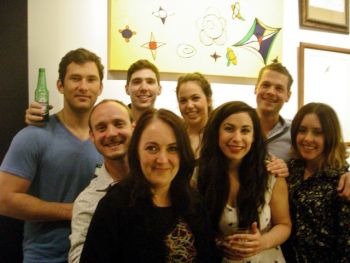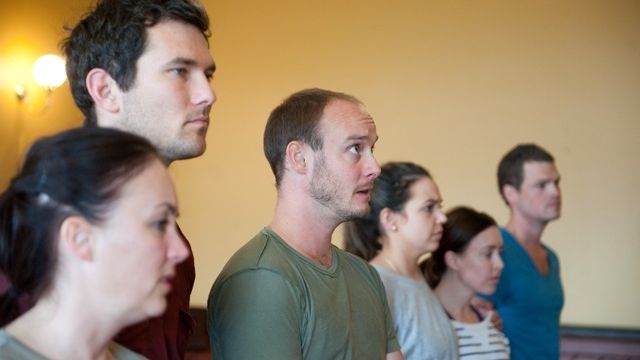The Art of Seeming Craftless
As “The Laramie Project” – the most critically acclaimed production of 2012 in Melbourne – goes into its final week, the cast took some time out to chat with Coral Drouyn about the process of ensemble acting.
“If you can’t listen, you can’t act. Scott and I were told that on our first day at Ballarat. To us, listening is just as important as the lines we speak.” The speaker is Maggie Chretien, just one of eight amazing actors who make up the cast of The Laramie Project, which closes on Nov 11th at Chapel off Chapel. The “Scott” she’s referring to (Scott Middleton) is sprawled next to her on the floor, and “Ballarat” is Ballarat Performing Arts Academy. There are six others sitting on the stairs, or the auditorium seats, or sprawling on the stage. Some are munching on a snack…it’s only an hour before curtain and the play is energy sapping, both emotionally and physically…yet all are totally relaxed. There’s no outward sign of the harrowing journey they’ll embark upon in an hour, when the seats are full and the Odyssey begins.
I’m impressed with Maggie, she’s responding to a comment I made that too often I see actors waiting for their next cue but not truly listening, frequently an indication of poor training. Adam Ward, whose charisma seems larger than his slight frame, chimes in. “In a company like this you’d get lost if you weren’t listening. We’re all playing so many roles, and sometimes we have to morph into another character instantly. We’re reacting all the time to the text.” Yes, I counter, but usually we see the actor’s technique at work…not so with this cast. Adam reacts defensively “we have technique. We have to have it or how would you hear us at the back of the theatre, how would you believe it?” Director Chris Baldock chimes in. “She means that it’s not in your face, that she can’t see that you’re acting.” That’s exactly what I mean. It’s a compliment Adam! I can see the art, but not the craft behind it. Scott chimes in, “We have all the craft skills, but they’re hidden underneath.”

I’ve seen many ensemble casts, but I have never seen a cast meld so perfectly into one living organism. They’re there to serve the words, to become the myriad of characters who were part of the interview process in Laramie and from which the play is constructed. “Leave your egos in the dressing room” is the Director’s order, and they obey. “We’re equals out here” Luke McKenzie tells me, “There are no star actors, no-one whose part is more important than anyone else. It’s not about the individual”. Of all the cast, Luke could be the one to bring his ego to the stage if he chose; he’s tasted celebrity as a Logie nominee in a TV series, but that seems like another Luke in another life. This isn’t about him, and he knows and honours that. Close by the impish Ibrahim “Ibby” Mustafa…whose flashy title means he’s “The Man” at Chapel off Chapel watches the informal interview and smiles. On opening night he told me “It makes me so proud to have a production that showcases such outstanding talent and a story that resonates deep within. You’ll be blown away.’ And he was right.
So how did Chris Baldock find this very special cast of “ego-less” actors? “I went through hundreds of hours of show-reels of people who had heard we were doing a new production of the play and wanted to be part of it. Some I had worked with before, like Scott and Maggie who are now Foundation Members of the company…. Some wanted to be part of Mocking Bird’s inaugural production, and some, like Christian and Adam, I had seen and knew I wanted to work with them. Most of all I wanted a cast that I knew would trust each other and the text.”

By the day of the first read Chris had allocated all the roles, more than 40, dividing them up carefully in a way that would be most truthful to those people who had entrusted their stories. It wasn’t for the easiest staging options, but for honesty’s sake. Thus Debra Low at one stage plays two characters in conversation with each other. Never does it seem comical, or untrue. Others have barely a second to morph into different characters going through astonishing emotional trauma. There’s no time for preparation of any kind. The cast never leaves the stage except for the intervals – and those are more for the audience; toilet breaks and time to dry the tears.
“For me, because I haven’t got the training, is was about knowing the characters,” the naturally gifted Christian Heath tells me, “letting them tell me who they were, how they reacted, because I knew every line of dialogue was something someone had actually said. So I could trust it to be real…and in some ways that made it easier….just being rather than acting.”
“The hardest part for me” says director Chris, “Was getting them to see and understand my vision. I knew once we all shared the same dream, we’d be fine.” There was no comfortable sitting-around-a- table first read and discussion. Instead, Chris physically threw them into the deep end, moving them all over the place before they had even got a grip on where they were. It was exhausting and exhilarating. “By the end of the first day we were so tired, but so pumped” the effusive Sarah Reuben explains. Tamara Donnellan, a pocket dynamo of an actress, agrees. “I don’t think we were prepared to be so physical so soon. It was a first day. But it showed us we had to know who we were, we had to trust the text and each other. There wasn’t any time to be self-indulgent.”
 Then there’s the fact that so much of the text is spoken directly to the audience, wasn’t that scary for them? Doing stand-up, I relished being direct with the audience, but many actors crave the safety of the fourth wall. “Well, Adam and I had both been puppeteers, and we make audience contact through the puppet characters. It’s just a matter of going one step closer.” Debra explains. Scott nods “Yep, and the audience takes the role of the interviewer a lot of the time, so it’s natural to talk direct.” “And some of us have done stand-up or fringe productions involving the audience.” Sarah chimes in, “Anyway, it’s not us. It’s the people of Laramie just telling their stories.” I might be talking to just one person, so in tune is the entire cast. There’s real love and respect between the actors and their director.
Then there’s the fact that so much of the text is spoken directly to the audience, wasn’t that scary for them? Doing stand-up, I relished being direct with the audience, but many actors crave the safety of the fourth wall. “Well, Adam and I had both been puppeteers, and we make audience contact through the puppet characters. It’s just a matter of going one step closer.” Debra explains. Scott nods “Yep, and the audience takes the role of the interviewer a lot of the time, so it’s natural to talk direct.” “And some of us have done stand-up or fringe productions involving the audience.” Sarah chimes in, “Anyway, it’s not us. It’s the people of Laramie just telling their stories.” I might be talking to just one person, so in tune is the entire cast. There’s real love and respect between the actors and their director.
The dictionary describes “ensemble” as a unit or group of complementary parts that contribute to a single effect. That “single effect” is the breath-taking theatre of The Laramie Project.”
Images: Top three rehearsal images by Sarah Walker. Bottom image of cast celebraing on opening night by Coral Drouyn.
Subscribe to our E-Newsletter, buy our latest print edition or find a Performing Arts book at Book Nook.

